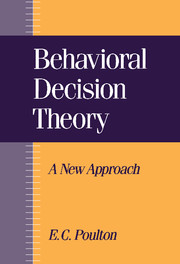Book contents
- Frontmatter
- Acknowledgments
- Contents
- Preface
- Chapter 1 Outline of heuristics and biases
- Chapter 2 Practical techniques
- Chapter 3 Apparent overconfidence
- Chapter 4 Hindsight bias
- Chapter 5 Small sample fallacy
- Chapter 6 Conjunction fallacy
- Chapter 7 Regression fallacy
- Chapter 8 Base rate neglect
- Chapter 9 Availability and simulation fallacies
- Chapter 10 Anchoring and adjustment biases
- Chapter 11 Expected utility fallacy
- Chapter 12 Bias by frames
- Chapter 13 Simple biases accompanying complex biases
- Chapter 14 Problem questions
- Chapter 15 Training
- Chapter 16 Overview
- References
- Index
Chapter 5 - Small sample fallacy
Published online by Cambridge University Press: 06 July 2010
- Frontmatter
- Acknowledgments
- Contents
- Preface
- Chapter 1 Outline of heuristics and biases
- Chapter 2 Practical techniques
- Chapter 3 Apparent overconfidence
- Chapter 4 Hindsight bias
- Chapter 5 Small sample fallacy
- Chapter 6 Conjunction fallacy
- Chapter 7 Regression fallacy
- Chapter 8 Base rate neglect
- Chapter 9 Availability and simulation fallacies
- Chapter 10 Anchoring and adjustment biases
- Chapter 11 Expected utility fallacy
- Chapter 12 Bias by frames
- Chapter 13 Simple biases accompanying complex biases
- Chapter 14 Problem questions
- Chapter 15 Training
- Chapter 16 Overview
- References
- Index
Summary
Summary
Tversky and Kahneman attribute the small sample fallacy to the heuristic that small and large samples should be equally representative. The normative rule is that small samples are not as representative as are large samples. Today not many people with a scientific training probably believe in what can be called the small sample fallacy for size or reliability of a sample, that samples of all sizes should be equally reliable. They are more likely to believe in what can be called the small sample fallacy for distributions, that small and large sample distributions should be equally regular. Small samples that appear too regular are judged to be less probable than are less regular samples. The gambler's fallacy is another small sample fallacy for distributions.
Investigators can reduce the number of students who believe in the small sample fallacy by demonstrating that small heterogeneous samples are often unrepresentative. A practical example of the small sample fallacy for size or reliability is the belief that an unexpected result in the behavioral sciences can be successfully replicated with a reduced size of sample.
Small samples assumed to be representative
People who commit the small sample fallacy can be said to assume that a small random sample should be as reliable as, and as regular as, a large random sample, but not too regular. Tversky and Kahneman (1971, p. 106; Kahneman and Tversky, 1972b, p. 435) attribute the small sample fallacy to the heuristic of representativeness.
- Type
- Chapter
- Information
- Behavioral Decision TheoryA New Approach, pp. 78 - 104Publisher: Cambridge University PressPrint publication year: 1994



